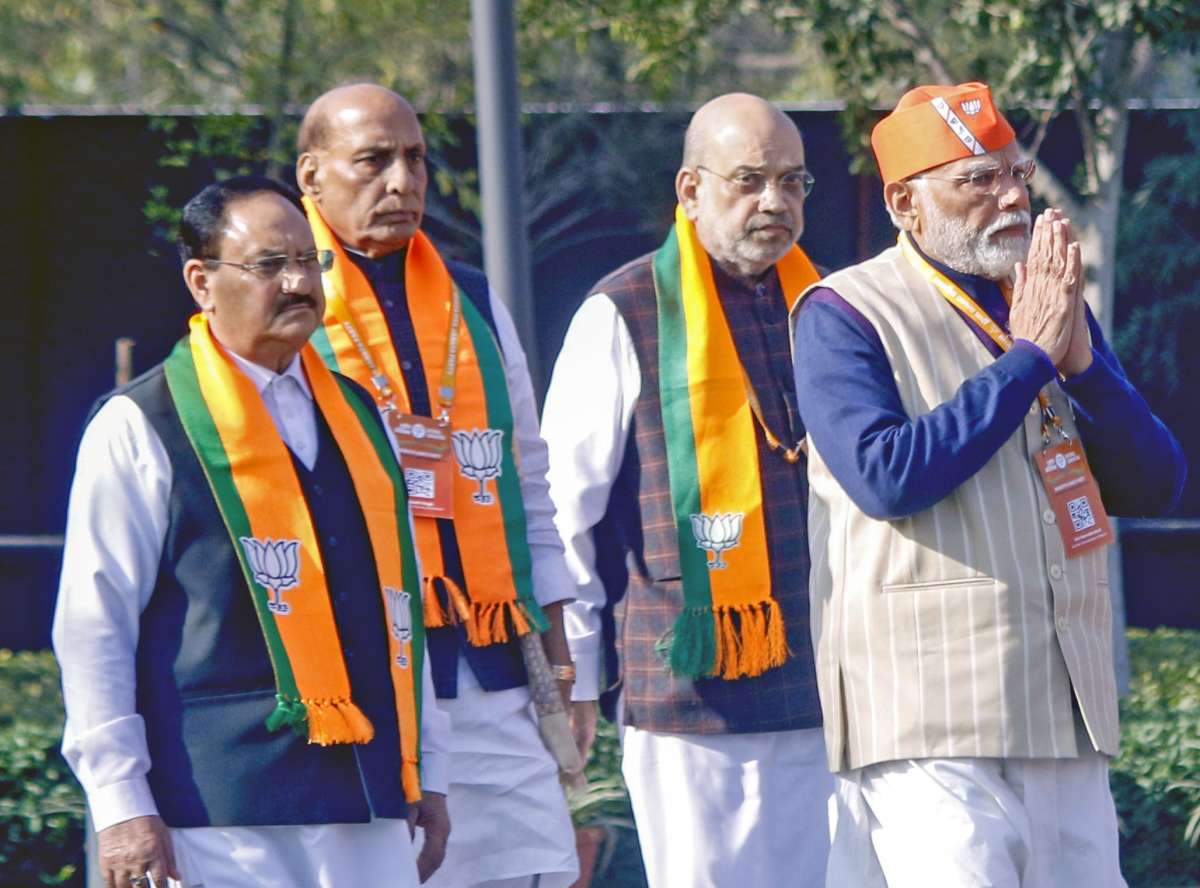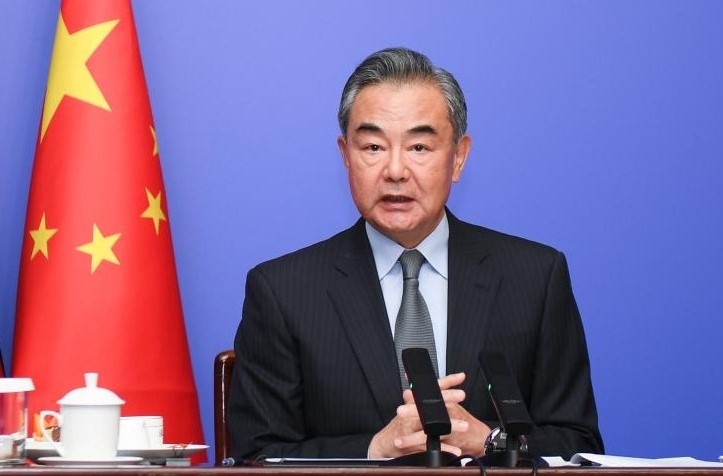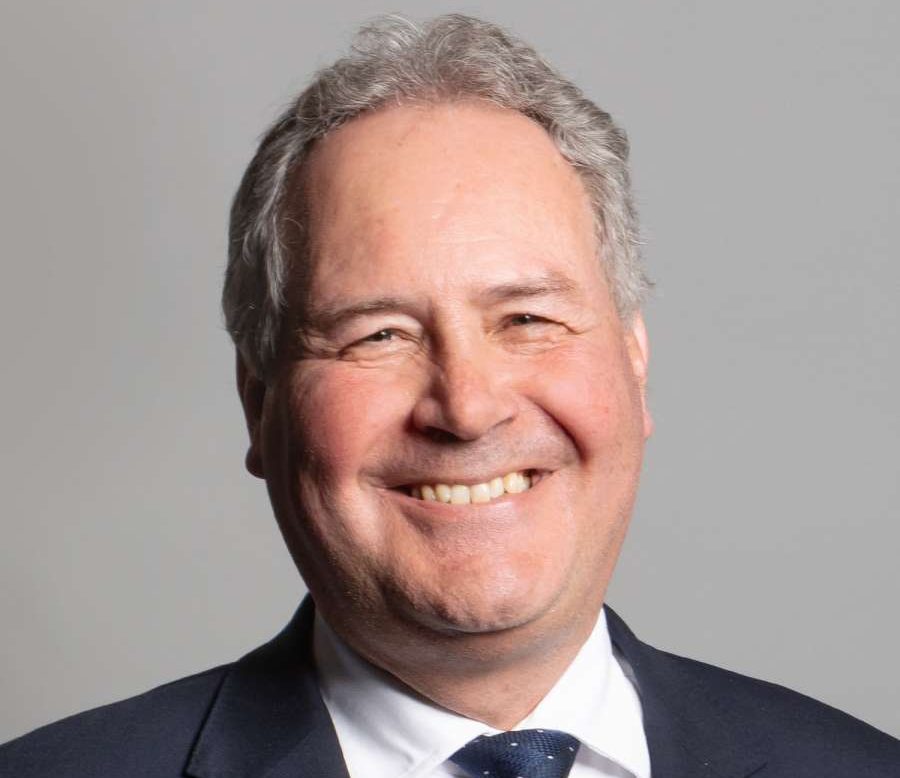With the formation of the BJP’s manifesto committee for the upcoming Lok Sabha elections, the party has kicked off the process for its preparation, which is to showcase the roadmap for a ‘Viksit Bharat’ and held its first meeting earlier this week….reports Asian Lite News
The first meeting of Bharatiya Janata Party (BJP) manifesto committee was held on Monday under the leadership of Defence Minister Rajnath Singh, where discussions took place on suggestions made by the public. The next meeting is likely to be held soon.
Union Minister Piyush Goyal, co-convener of the BJP Manifesto Committee, said at a press conference that on Friday the first meeting of the Manifesto Committee was held.
“There were eight Union Ministers, including Rajnath Singh, three Chief Ministers, Bhupendra Patel, Vishnu Dev Sai, Dr. Mohan Yadav, and many other senior leaders who are members of the committee, who remained present and had a meaningful discussion,” he said.
“BJP takes each and every issue seriously in every Sankalp Patra, discusses it and includes it in the Sankalp Patra . Our party has a robust mechanism by which the Sankalp Patra is prepared. This is an initial manifesto and it will be finalised in a few days,” he added.
Everyone gave their suggestions on different topics, what can be done on their valuable topics, what kind of developed ‘India@2047’ will be, what will be the outline of the party, what will be the outline of the government. Regarding this, the resolution letter of Prime Minister Narendra Modi for the third term was discussed, said Piyush Goyal at the press conference.
Before this, for about 35 days, 916 video vans travelled across the country to reach out to common people and seek their suggestions. They visited more than 3,500 assembly constituencies and met eminent people from different societies in 100 cities, added Goyal.
Meetings with businessmen, organisations, the trade industry, and intellectuals were held in more than 100 cities and thousands of different suggestions were given to the ministers and leaders of our party.
A missed call campaign was also run by the Bharatiya Janata Party. Around 3.45 lakh suggestions were given across the country. People were contacted through the missed call campaign. Those who expressed their desire to talk, want to say something, or have suggestions were also incorporated.
We all have access to its database. At the same time, people are connected to Namo App, which is widely used across the country. Around 1,70,000 suggestions have been received in Namo App. This in itself shows how much enthusiasm there is among the people of the country and how much participation Prime Minister Narendra Modi has received, added Piyush Goyal.
By creating a kind of database of all these suggestions and compiling them, a very meaningful discussion took place today. Our committee members, considering all the sections of society and considering the different suggestions that have come, gave priority to the interests of the country and the public.
After shortlisting, some time will be taken to think further on the suggestions and the committee will meet after a few days. All the members will also bring their own views on these suggestions after doing some study on these suggestions in the next meeting, Piyush Goyal said further.
With the formation of the BJP’s manifesto committee for the upcoming Lok Sabha elections, the party has kicked off the process for its preparation, which is to showcase the roadmap for a ‘Viksit Bharat’ and held its first meeting on Monday.
The 27-member manifesto committee led by senior BJP leader Rajnath Singh has 11 ministers besides four chief ministers of the party-ruled states.
Union finance minister Nirmala Sitharaman has been appointed the convener of the committee, while Union commerce minister Piyush Goyal has been made the co-convener. The manifesto committee also has one BJP leader from each of the minority communities, including Sikhs, Muslims and Christians. (ANI)
Those ‘dancing’ over Electoral Bond will repent it: Modi
Prime Minister Narendra Modi addressed concerns regarding the electoral bond controversy, dismissing notions that it had negatively impacted his government. During an interview with Thanthi TV, he emphasized that while every system has its flaws, they can be rectified. PM Modi cautioned against those celebrating the issue, suggesting they would eventually regret their actions.
Addressing questions about whether the revelation of electoral bond details posed a setback for the ruling BJP, PM Modi told Thanthi TV during an interview, “Tell me what have we done that I should see it as a setback? I firmly believe that those dancing over it (bond details) and taking pride in it are going to repent.”
Highlighting the significance of the electoral bond system implemented by his administration, PM Modi noted its role in tracing funding sources and beneficiaries. He credited the transparency in funding to the electoral bond mechanism established during his tenure, contrasting it with the opacity in funding sources prior to 2014.
Acknowledging that no system is flawless, PM Modi stressed the need for continuous improvement to address any shortcomings. Opposition parties have criticized the anonymous funding practice facilitated by electoral bonds, following revelations after a Supreme Court order brought related information into the public domain.
In the interview, PM Modi asserted his commitment to serving the country and highlighted the potential of Tamil Nadu as a crucial strength. He emphasized that his actions should not be politicized, stating that his efforts extend beyond electoral considerations, citing developments in northeast states as an example.
PM Modi expressed confidence in the BJP-led National Democratic Alliance’s appeal in Tamil Nadu, asserting that votes for the alliance would not be anti-DMK but rather pro-BJP. He praised Tamil Nadu BJP president K Annamalai for his appeal among youth and emphasized the BJP’s efforts in the state, even in the absence of municipal candidates.
The prime minister emphasized his vision of a developed India, stating that Tamil Nadu has the potential to drive this vision forward. He regretted the politicization of the Tamil language and advocated for its promotion alongside the globalization of Tamil cuisine.
In conclusion, PM Modi’s remarks showcased his administration’s commitment to transparency and improvement while addressing concerns related to electoral funding. He reiterated his focus on national development and highlighted the importance of Tamil Nadu’s potential in realizing this vision.














